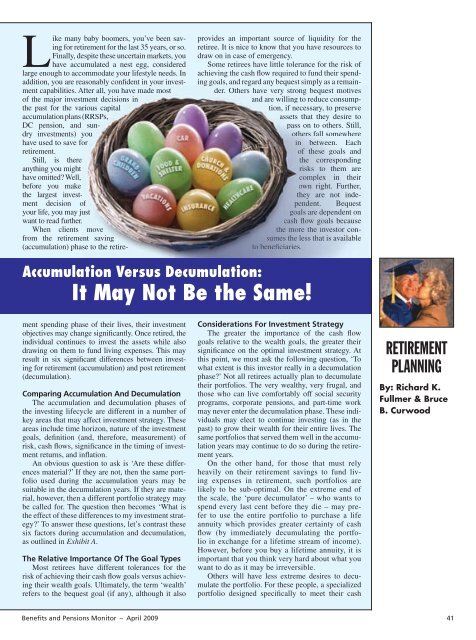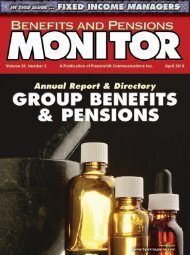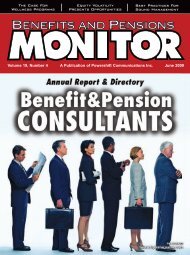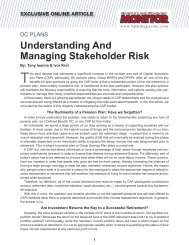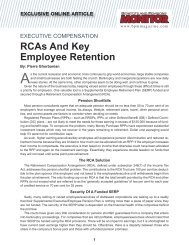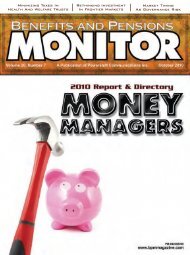April - Benefits and Pensions Monitor
April - Benefits and Pensions Monitor
April - Benefits and Pensions Monitor
You also want an ePaper? Increase the reach of your titles
YUMPU automatically turns print PDFs into web optimized ePapers that Google loves.
provides an important source of liquidity for the<br />
retiree. It is nice to know that you have resources to<br />
draw on in case of emergency.<br />
Some retirees have little tolerance for the risk of<br />
achieving the cash flow required to fund their spending<br />
goals, <strong>and</strong> regard any bequest simply as a remainder.<br />
Others have very strong bequest motives<br />
<strong>and</strong> are willing to reduce consumption,<br />
if necessary, to preserve<br />
assets that they desire to<br />
pass on to others. Still,<br />
others fall somewhere<br />
in between. Each<br />
of these goals <strong>and</strong><br />
the corresponding<br />
risks to them are<br />
complex in their<br />
own right. Further,<br />
they are not independent.<br />
Bequest<br />
goals are dependent on<br />
cash flow goals because<br />
the more the investor consumes<br />
the less that is available<br />
to beneficiaries.<br />
Accumulation Versus Decumulation:<br />
It May Not Be the Same!<br />
Like many baby boomers, you’ve been saving<br />
for retirement for the last 35 years, or so.<br />
Finally, despite these uncertain markets, you<br />
have accumulated a nest egg, considered<br />
large enough to accommodate your lifestyle needs. In<br />
addition, you are reasonably confident in your investment<br />
capabilities. After all, you have made most<br />
of the major investment decisions in<br />
the past for the various capital<br />
accumulation plans (RRSPs,<br />
DC pension, <strong>and</strong> sundry<br />
investments) you<br />
have used to save for<br />
retirement.<br />
Still, is there<br />
anything you might<br />
have omitted? Well,<br />
before you make<br />
the largest investment<br />
decision of<br />
your life, you may just<br />
want to read further.<br />
When clients move<br />
from the retirement saving<br />
(accumulation) phase to the retire-<br />
ment spending phase of their lives, their investment<br />
objectives may change significantly. Once retired, the<br />
individual continues to invest the assets while also<br />
drawing on them to fund living expenses. This may<br />
result in six significant differences between investing<br />
for retirement (accumulation) <strong>and</strong> post retirement<br />
(decumulation).<br />
Comparing Accumulation And Decumulation<br />
The accumulation <strong>and</strong> decumulation phases of<br />
the investing lifecycle are different in a number of<br />
key areas that may affect investment strategy. These<br />
areas include time horizon, nature of the investment<br />
goals, definition (<strong>and</strong>, therefore, measurement) of<br />
risk, cash flows, significance in the timing of investment<br />
returns, <strong>and</strong> inflation.<br />
An obvious question to ask is ‘Are these differences<br />
material?’ If they are not, then the same portfolio<br />
used during the accumulation years may be<br />
suitable in the decumulation years. If they are material,<br />
however, then a different portfolio strategy may<br />
be called for. The question then becomes ‘What is<br />
the effect of these differences to my investment strategy?’<br />
To answer these questions, let’s contrast these<br />
six factors during accumulation <strong>and</strong> decumulation,<br />
as outlined in Exhibit A.<br />
The Relative Importance Of The Goal Types<br />
Most retirees have different tolerances for the<br />
risk of achieving their cash flow goals versus achieving<br />
their wealth goals. Ultimately, the term ‘wealth’<br />
refers to the bequest goal (if any), although it also<br />
Considerations For Investment Strategy<br />
The greater the importance of the cash flow<br />
goals relative to the wealth goals, the greater their<br />
significance on the optimal investment strategy. At<br />
this point, we must ask the following question, ‘To<br />
what extent is this investor really in a decumulation<br />
phase?’ Not all retirees actually plan to decumulate<br />
their portfolios. The very wealthy, very frugal, <strong>and</strong><br />
those who can live comfortably off social security<br />
programs, corporate pensions, <strong>and</strong> part-time work<br />
may never enter the decumulation phase. These individuals<br />
may elect to continue investing (as in the<br />
past) to grow their wealth for their entire lives. The<br />
same portfolios that served them well in the accumulation<br />
years may continue to do so during the retirement<br />
years.<br />
On the other h<strong>and</strong>, for those that must rely<br />
heavily on their retirement savings to fund living<br />
expenses in retirement, such portfolios are<br />
likely to be sub-optimal. On the extreme end of<br />
the scale, the ‘pure decumulator’ – who wants to<br />
spend every last cent before they die – may prefer<br />
to use the entire portfolio to purchase a life<br />
annuity which provides greater certainty of cash<br />
flow (by immediately decumulating the portfolio<br />
in exchange for a lifetime stream of income).<br />
However, before you buy a lifetime annuity, it is<br />
important that you think very hard about what you<br />
want to do as it may be irreversible.<br />
Others will have less extreme desires to decumulate<br />
the portfolio. For these people, a specialized<br />
portfolio designed specifically to meet their cash<br />
RETIREMENT<br />
PLANNING<br />
By: Richard K.<br />
Fullmer & Bruce<br />
B. Curwood<br />
<strong>Benefits</strong> <strong>and</strong> <strong>Pensions</strong> <strong>Monitor</strong> – <strong>April</strong> 2009<br />
41


